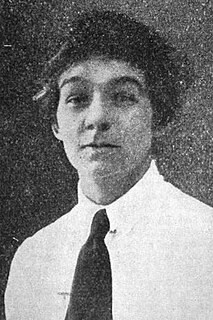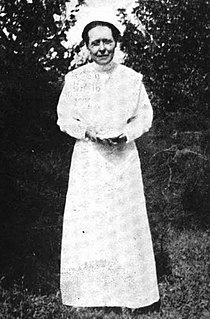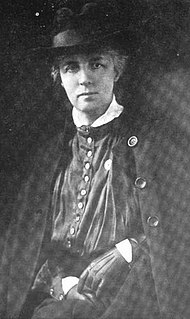This page is based on this
Wikipedia article Text is available under the
CC BY-SA 4.0 license; additional terms may apply.
Images, videos and audio are available under their respective licenses.

Jane Arminda Delano, born March 13, 1862 in Montour Falls, New York – died April 15, 1919 in Savenay, Loire-Atlantique, France, was a nurse and founder of the American Red Cross Nursing Service.

Julia Catherine Stimson was an American nurse, credited as one of several persons who brought nursing to the status of a profession.

Lavinia Lloyd Dock was a nurse, feminist, author, pioneer in nursing education and social activist. Dock was an assistant superintendent at Johns Hopkins School of Nursing under Isabel Hampton Robb. With Robb and Mary Adelaide Nutting, she helped to found the organization that would become the National League for Nursing. Dock was a contributing editor to the American Journal of Nursing and she authored several books, including a four-volume history of nursing and what was for many years a standard nurse's manual of drugs. She campaigned for women's rights for many years.
The word "nurse" originally came from the Latin word "nutrire", meaning to suckle, referring to a wet-nurse; only in the late 16th century did it attain its modern meaning of a person who cares for the infirm.

The United States Army Nurse Corps was formally established by the U.S. Congress in 1901. It is one of the six medical special branches of officers which – along with medical enlisted soldiers – comprise the Army Medical Department (AMEDD).
Army nursing may refer to:

Annie Warburton Goodrich was an American nurse and academic. She was born in Brunswick, New Jersey and grew up in Hartford, Connecticut. Her grandfather was John S. Butler.
World War I marked the first war in which American women were allowed to enlist in the armed forces. While thousands of women did join branches of the army in an official capacity, receiving veterans status and benefits after the war's close, the majority of female involvement was done through voluntary organizations supporting the war effort. Additionally, women made an impact on the war indirectly by filling the workforce, becoming employed in the jobs left behind by male soldiers.

The History of nursing in the United States focuses on the professionalization of nursing since the Civil War.
The National Association of Colored Graduate Nurses was a professional organization for African American nurses founded in 1908.

Helen Grace McClelland , a United States Army nurse, was awarded the United States Distinguished Service Cross and the British Royal Red Cross Medal for heroic actions during World War I while serving at a British Base Hospital in France. McClelland was one of only three women to receive the Distinguished Service Cross award during World War I. After returning to the United States, McClelland spent twenty-three years as Director of Pennsylvania Hospital's School of Nursing. In her role, McClelland advocated for the professionalization and modernization of nursing. McClelland was inducted into the Ohio Women's Hall of Fame in 1978.
Beatrice Mary MacDonald, an American Army nurse during World War I, received a Purple Heart for combat wounds on January 4, 1936, making her retroactively the first women to receive the award. MacDonald was also one of three women to receive the United States Distinguished Service Cross for her heroism during World War I. Other awards for her heroism include the French Croix de Guerre (Bronze), a British Military Award for gallantry, the British Royal Red Cross medal, and the United States Distinguished Service Medal.
Jane I. Rignel St. John was a United States Army nurse who was the Chief Nurse of Mobile Hospital No. 2 during World War I. For her heroism she was awarded the French Croix de Guerre, the British Royal Red Cross, and the United States Silver Star medal.

Helen Scott Hay was an American Red Cross nurse and nursing educator, working in Kiev and Sofia during World War I. She was awarded the Florence Nightingale Medal by the International Red Cross Society for her contributions.

Melinda Konover Meirs, known as Linda K. Meirs, was an American Red Cross and Army nurse during World War I. She was one of the first six American recipients of the Florence Nightingale Medal, awarded by the International Committee of the Red Cross in 1920.

Mary Elizabeth Gladwin was an English-born American Red Cross nurse active in three wars. She was one of the first six American nurses to receive the Florence Nightingale Medal when it was awarded by the International Committee of the Red Cross in 1920.

Martha Montague Russell was an American nurse in World War I. She was one of the first six American nurses to receive the Florence Nightingale Medal when it was awarded by the International Committee of the Red Cross in 1920.

Lucy Minnigerode was an American nurse in World War I, and founder of the United States Public Health Service Nursing Corps. She was the eighth American recipient of the Florence Nightingale Medal, awarded by the International Committee of the Red Cross in 1925.

Katrina Hertzer was an American nurse during World War I, serving as Chief Nurse of the United States Navy Nurse Corps.















